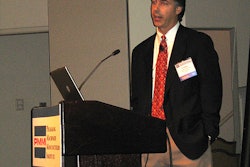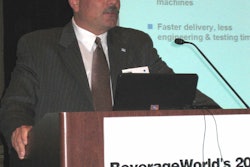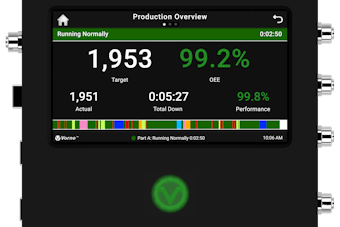Was it an eerie coincidence that the Hall and Oates song “Private Eyes [are Watching You] played before a keynote address at the RFID Journal Live! conference in March? (see Consumer privacy and RFID, published in April 2005.)
Privacy is an issue that some see as a potential dark cloud to RFID's silver lining, while others dismiss it out of hand.
But expert Shahram Moradpour is not one of them. “I see privacy as one of the factors that looms larger than the technical barriers," he says. He points to Spychips, a book published in October that’s an extension of a Web site of the same name run by the coauthor, Katherine Albrecht. She is said to link RFID to the Biblical End Times as the Mark of the Beast mentioned in John's book of Revelation. Previously, other authors have similarly linked the End Times to the UPC.
The fact the book has ranked among the Top 200 or so on Amazon sales (in early October) makes it worthy of attention, if not concern, says Moradpour, who has also written a book on RFID and thus has a personal interest in tracking sales of RFID books.
"Those numbers tell me that even though people within the world of RFID, and especially vendors, say 'don't worry about privacy,' there seems to be a big interest on the part of consumers,” he says. “The reality is that people pay attention to this stuff, so it cannot be dismissed. The best way to address it is through education." Companies like Wal-Mart and P&G have offered educational information on their Web sites.
Mr. RFID Louis Sirico, who has dined with Albrecht, says she raises some valid concerns about privacy and tracking. However, Sirico points out that RFID itself is a piece of information that, if matched to another particular piece of information, [I]might[n] be useful to someone. But he feels secure since combining diverse databases and mining deep enough to gain useful information would seem impractical if not impossible.
"So they figure out I buy Listerine weekly, big deal," says Siroco. Seriously, he knows that companies regard safeguarding such data as critical, and that "consumers' doubts and uncertainty can be removed using education."
That's what changed consumer fears in Germany at Metro Group's Store of the Future, which features item-level tagged products. Patrick Yanahan, president of USA Strategies Inc. consultants, says a 20% dropoff in returnees to that Metro store led to an aggressive marketing campaign comprising local media spots, in-store educational materials, and a "tag kill" kiosk. The result? Returnee dropoff was lowered to less than 1%, Yanahan reports.
AIM Global, the trade association representing RFID manufacturers, believes that policies and procedures should be put into place to ensure consumers the following rights:
AIM Global also created a distinctive emblem to be placed on any RFID label or tag to indicate the type of RFID being used.
"There are some real and serious issues with privacy and security with RFID that need to be answered," sums RFID authority Kevin Ashton, "though I don't see it as a major challenge."
According to consumer research by CapGemini 2 released in early 2005, Consumer Education is Key to Boosting Awareness and Overcoming Misconceptions about RFID, privacy-related issues are the most significant consumer worry. More than half of respondents express concern about:
• Third-party use of their personal data
• Tracking of consumers via the RFID labels in the products they purchase • Increases in unwelcome direct marketing
• The possibility that RFID labels can be read at a long distance years.
According to research by IDTechEx, 500 million RFID labels will be used globally on pallets and cases in 2006, including those containing food, drinks, beauty and pharmaceutical products. Indeed, by 2015, there could be over 400 billion RFID labels fitted to consumer goods, creating an RFID market worth US $24.5 billion globally.
Companies involved in RFID should stay abreast of privacy issues and address them, perhaps proactively, using education.
























